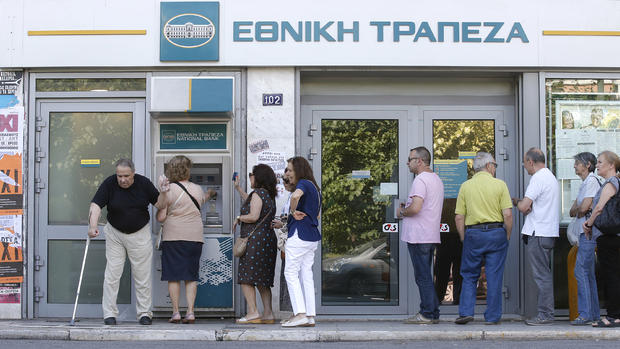Greece hopes a third bailout will be a charm
Greek Prime Minister Alexis Tsipras has confounded and infuriated his nation's creditors ever since his Syriza party was swept into power last year on an anti-austerity platform. Now, with the financial crisis threatening to sink his cash-strapped country's economy, Greece's creditors say the time for talk is coming to an end.
And that end will come this weekend, when the 28 members of the European Union are scheduled to meet in Brussels to decide on the 53.5 billion euro ($59 billion) bailout proposal that the Greek government submitted late Thursday. Their decision will be pivotal after months of talking and delaying and talking and delaying. If they go along with Greece's latest proposal, it will be the third bailout granted to the country, which has already had two worth 240 billion euros.
The plan Tsipras put forward on Thursday includes spending cuts and tax increases worth between 12 billion euros and 13 billion euros ($13 billion to $14 billion), according to the Washington Post. That's higher than the value of the austerity measures Greek voters rejected in a recent referendum.
French President Francois Hollande says the Greek proposals are "serious and credible" but stressed that nothing is final yet.
Hollande told reporters in Paris that the Greeks have "just shown a determination to want to stay in the eurozone, because the program that they are presenting is serious and credible."
The German government isn't giving an immediate verdict on the list of reform measures submitted by Greece, saying that it will wait for the assessment of the country's formal creditors.
Chancellor Angela Merkel's spokesman, Steffen Seibert, said he "cannot yet evaluate these new Greek proposals in terms of substance." He said Berlin will wait for the European Commission, the European Central Bank and International Monetary Fund to deliver their verdict.
Greece is in deep trouble and closer than ever to the abyss. It's due to make a 3.5 billon euro ($3.85 billion) payment to the European Central Bank on July 20. But it can't get assistance from the International Monetary Fund after missing a June 30 deadline for a $1.7 billion payment to that organization. The country's financial bailout package from its European neighbors has also expired.
Even under the most optimistic of scenarios, the road ahead for Greece remains difficult, and economists are growing skeptical that a Greek exit from the euro, or a Grexit, can be avoided even if the current crisis is resolved.
"We argue that Greece is unlikely, barring deep political and economic changes, to be able and willing to implement the conditionality of any 2- to 3-year program that can be agreed upon," wrote Citigroup chief global economist Willem Buiter, in a note to clients on Thursday. "The willingness of the creditor institutions to condone yet another extend-and-pretend has been stretched to its limit. Even if we get a deal this Sunday ... Grexit therefore is more likely than not for the next 2- to 3-years in our view."
American billionaire Wilbur Ross, who has made an investment in Greece's third-largest bank, and others have noted that leaving the euro and returning to its former currency, the drachma, would devastate the country's economy. One reason is that the drachma would trade at a steep discount to both the dollar and euro.
"That would effectively mean every salaried employee and every pensioner in Greece has lost a very large percentage of their effective buying power," Ross said in an interview with CBS MoneyWatch. "That can't be very good."
Tsipras has argued that Greece's debt level is unaffordable and some of it needs to be forgiven, a view many economists back. But Germany's Merkel, whose country is Greece's largest creditor, has rejected notion of lenders getting a "haircut," or a reduction in debt that needs to be paid back. One reason for Merkel's reluctance has been Greece's inability to take steps that other European countries on the receiving end of bailouts have taken, such as tax increases and spending cuts.
At the start of the year, Alberto Gallo, a London-based economist for RBS, had forecast a surplus for Greece because the country seemed to be on the mend at the time. He now argues that keeping Greece in the eurozone would be far cheaper for the country's public and private creditors than pushing it out. "The Grexit scenario is a lose-lose for everyone," said Gallo in an interview with CBS MoneyWatch.
Greece's economy is in similar shape to what the U.S. experienced during the Great Depression. Its GDP has contracted by more than 25 percent since 2007. Unemployment now tops 25 percent. And business activity is grinding to a halt as banks have been closed to prevent them from collapsing.
"Under an optimistic scenario," wrote Diego Iscaro, an economist with IHS Global Insight, in an email to CBS MoneyWatch, "the economy could gradually start stabilizing by the fourth quarter of the year but we don't expect a strong recovery."
But first, there's the matter of a bailout proposal and a summit meeting in Brussels.
